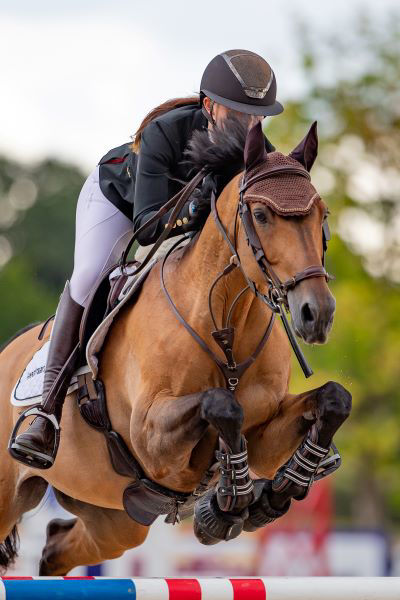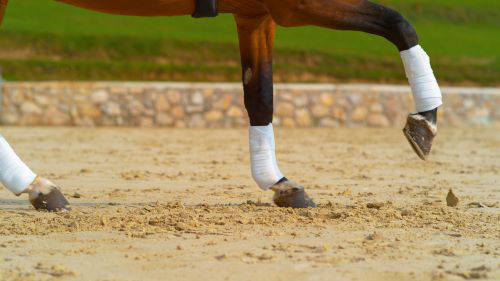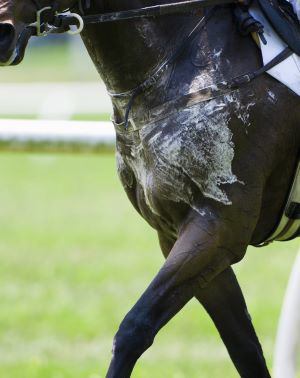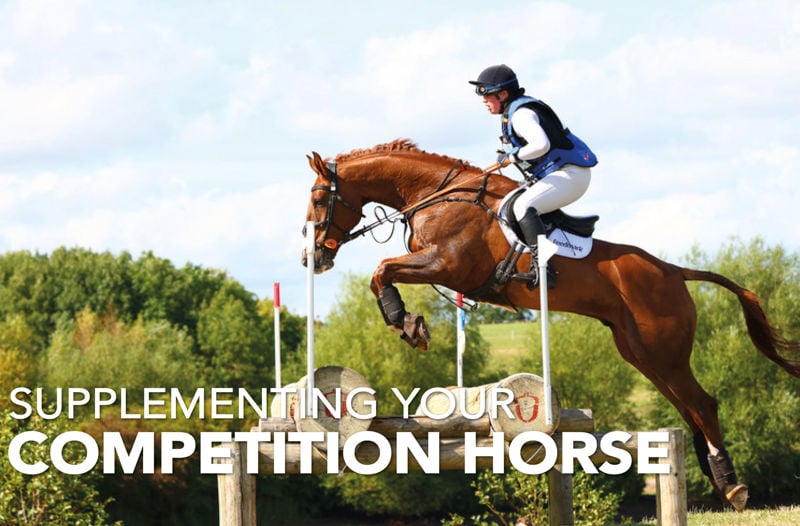The modern competition horse is a true athlete, but like all athletes, this means they can be exposed to events that can cause both mental and physical stress which can affect their overall body systems. For competition horses, any ailments or struggles can lead to reduced performance or injury. To achieve maximum performance, competition horses require targeted nutrition to keep them on track and maintaining optimal health and fitness.
Correct training, sufficient fitness, and adequate recovery are all required in the management of competition horses with diet also playing a key role in a competition horse’s success. Using supplements can help to support your horse where they may need a little bit of extra assistance.

The modern competition horse is a true athlete
Digestive health
Travelling can increase a horse’s risk of digestive upset so supporting the digestive system is key to reducing the risk of issues.
Stress due to travelling can negatively impact digestive health and going to regular competitions can lead to changes in routine which leads to inconsistent feeding times. These factors can easily lead to digestive upset as they change the fine balance of the gastrointestinal tract.
Using a digestive supplement can support digestigve health. If you notice your horse suffers from loose droppings, look for a supplement to support hindgut health. One that contains pre and pro-biotics will help to maintain a healthy hindgut environment.
Gastric Ulcers are also a common occurrence in competition horses so if this is of concern, make sure you manage horse horse in a way that optimises their digestive health.
Joint support
Training and competition can increase wear and tear on the horse’s joints. Horse joint supplements are a good way to maintain mobility and suppleness and reduce the risk of joint injuries that are associated with worn joints.
Look for a joint supplement that contains high levels of proven joint nutrients - Glucosamine, MSM, Chondroitin and Hylarounic Acid. Additional support can be provided by Boswellia, Omega-3 fatty acids, and antioxidants such as Vitamin C. This will offer your horse the best support.
Glucosamine supports damaged cartilage. Chondroitin is a vital part of cartilage and can support cartilage repair mechanisms. MSM provides sulphur which is important for maintaining collagen, and Hyaluronic Acid maintains joint lubrication and supports inflamation.

Training and competition can increase wear and tear on the horse’s joints.
Muscle support
Hardworking muscles require antioxidants to help with the recovery process. Vitamin E is a powerful antioxidant and works with Selenium to provide antioxidant support. Antioxidants play a vital role in minimising exercise-induced oxidative damage, supporting normal muscle repair, and speeding up recovery after exercise. When horses exercise, natural stores of antioxidants are depleted making it necessary to supplement the diet. Horses with muscle disorders also require higher levels of antioxidants to maintain muscle health. We recommend feedinga supplement that provides these essential nutrients for optimum nerve and muscle function.
Exercise increases the horse's body's need for protein to help maintain new muscle mass and repair existing muscle. Muscles are mostly made up of protein, and for them to develop and repair properly the diet must contain good-quality protein. Key amino acids in the diet must be provided and are required to support protein synthesis. Look at supplements that help to develop muscle mass as well as support muscle recovery and lactic acid recycling which is essential for performance horses.
Electrolytes
Hard work and travelling cause the horse to sweat which leads to a loss of important electrolytes. Electrolytes are required for correct muscle and nerve function as well as maintaining optimal hydration. Electrolytes support glycogen replenishment in the muscles and a dehydrated horse will not be able to replenish muscle glycogen levels efficiently.
Feeding an electrolyte when travelling, competing, and training hard will replenish lost electrolytes. Important electrolytes are Sodium which aids absorption of key nutrients and maintains gastric pH, Chloride which is used for CO2 removal and activation of enzymes, Potassium which is required for hormone release, energy transfer and protein synthesis, Magnesium which is linked to cell respiration and enzyme activation, and Calcium which is an important mineral for muscle and nerve function and cell wall structure.

Hard work causes the horse to sweat which leads to a loss of important electrolytes
Respiratory Health
Horses are natural athletes with a staggering ability to take in oxygen and deliver it via the lungs to working muscles. Therefore, to be able to perform at their best, competition horses need to be able to fully utilise their respiratory system.
The respiratory system regulates heart rate and supplies vital oxygen to the body during exercise. The horse’s respiratory rate during exercise will determine how much oxygen is supplied to the muscles and how much carbon dioxide is removed from the body.
Travelling and stabling are common for competition horses and these practices greatly increase the horse’s exposure to dust and allergen particles. Some horses may also suffer from seasonal respiratory issues linked to pollen. Even if your horse doesn’t have an obvious respiratory issue, travelling and stabling increase the chance of respirable particles being taken into the lungs so offering respiratory support is recommended.

Some horses may also suffer from seasonal respiratory issues linked to pollen.
Competition horses require targeted nutrition to maintain peak performance and overall health. Key areas include digestive health, with pre- and pro-biotics supporting gut balance, and joint health. Muscle recovery is supported by antioxidants like Vitamin E and high-quality protein for repair and growth. Electrolytes help replenish lost minerals during intense exercise, while respiratory support is vital for horses exposed to allergens and dust from travel or stabling. Proper nutrition and supplementation are essential for optimising a competition horse’s health and performance.
If you have any questions, or would like any further advice, please do not hesitate to contact our Registered Nutritionist, Stephanie Hyland, on 0880 585525, email [email protected], or drop us a message on social media.
Cover photo - Sponsored Rider, Lucy Richards, and Wicklow Into Orbit.



